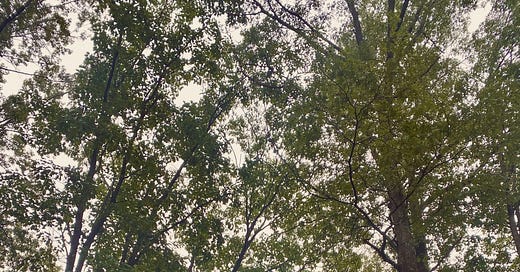Dear ones,
P says I’m not allowed to talk about fall until after his birthday. A real Leo in his commitment to the season, he is. But we can feel it, the sky shading sooner to dusk, the color of the sun on the trees reaching for that sepia that autumn always offers. These teens in the cafe now, too, as I write this to you – they are both languid and eager, wanting the last tastes of carefree summers but maybe also a little itchy to get back to weekday routines, to excuses to see their friends every day. I’m also feeling the season change alongside the collective vibration of ‘back to school’; I am, for the first time in years, preparing to teach again full-time. These early weeks of August, for most educators, are accompanied by both stress and excitement, and a shift in the body that’s readying for change.
Cicadas also know a lot about how time feels in the body, and I found my first shell of one on a walk this week. I’d been hearing their song in the neighborhood lately but hadn’t seen the mess of shells that usually accompanies their arrival above ground. In case you’ve never dug into the literature on this little aphid: they are creatures who live most of their lives underground as nymphs and, for periodical cicadas*, emerge collectively above ground every 13 or 17 years. They live sometimes as long as 20 years underground but after emergence their life span is measured in mere weeks. When I google things like “do cicadas know they are emerging to their death”, I don’t get much insight into their emotional state, but I like to think they feel some joy in the size of the world and the sight of the clouds even if it is the last blip of their days.
And they do sing, after all, a thing we do to celebrate (and also a thing we do to mourn). The sound we associate with cicadas is always the mating song of the male, which creates that intense vibration in the trees. David Rothenberg is known for “jamming” with the insects when they sing; he says their song is “strange but beautiful,” says it’s like “chords and transitions in Wagner’s operas.”
A primary reason they emerge en mass is so that more of them have the chance of surviving predators. When they litter the forest floor they create a massive feast for birds, insects, and fungi, but with so many morsels to feed on, the hunters eventually get full. The remaining cicadas are then free to mate and ensure a new generation begins growing underground. This makes me think of George Bataille’s writings on sacrifice, which he says is an inherently erotic and life-giving desire we’d all have if we were in touch with what he calls “the sacred.” These insects brave the sun for a week or less, just for the possible chance to mate, and, also, for the glorious chance to die for a purpose. “Sacrifice is nothing other than the production of sacred things,” Bataille says. Little cicada eggs nested in the lines of tree bark….what a holy thing.
All living things are creatures of temporal urges, but the trappings of the modern era would like us to forget that. Going back to school is not the same as the cicadas’ primal drive to explode through the soil to fuck and sing, but I like the potency of the embodied reminder. Our animal neighbors don’t buy fresh notebooks as the summer ends, but many of them do shift gears to more structure and productivity. I think when we let our bodies pay attention to what the land is doing, we get clarity not just on what we need but on what we want. Our basest desires are always in synch with the desires of nature, because we’re a part of it.
Recommendations with links below, as always. <3
love & solidarity,
raechel
*the next Brood isn’t supposed to emerge together until 2024 (the last time was 2021). What I found was likely the shell of an annual cicada.
Reading
Keep reading with a 7-day free trial
Subscribe to radical love letters to keep reading this post and get 7 days of free access to the full post archives.




